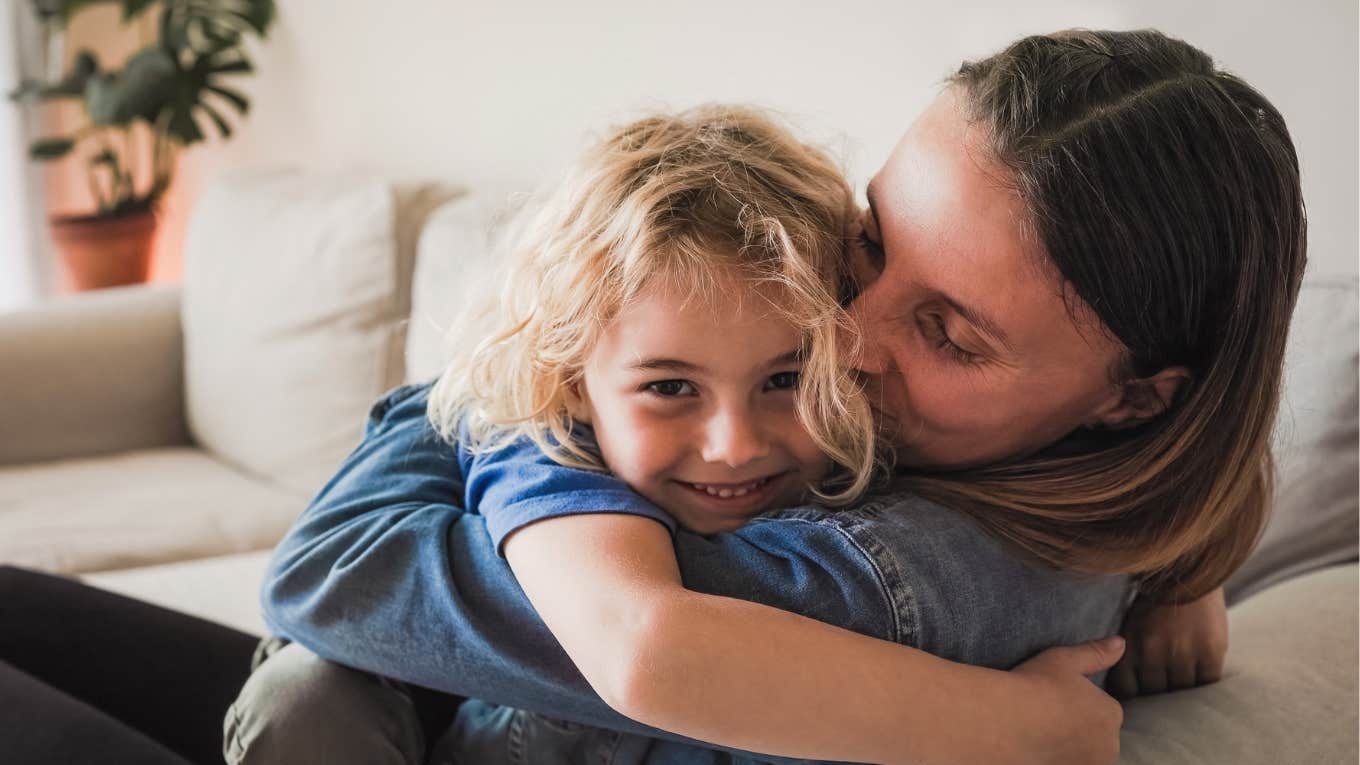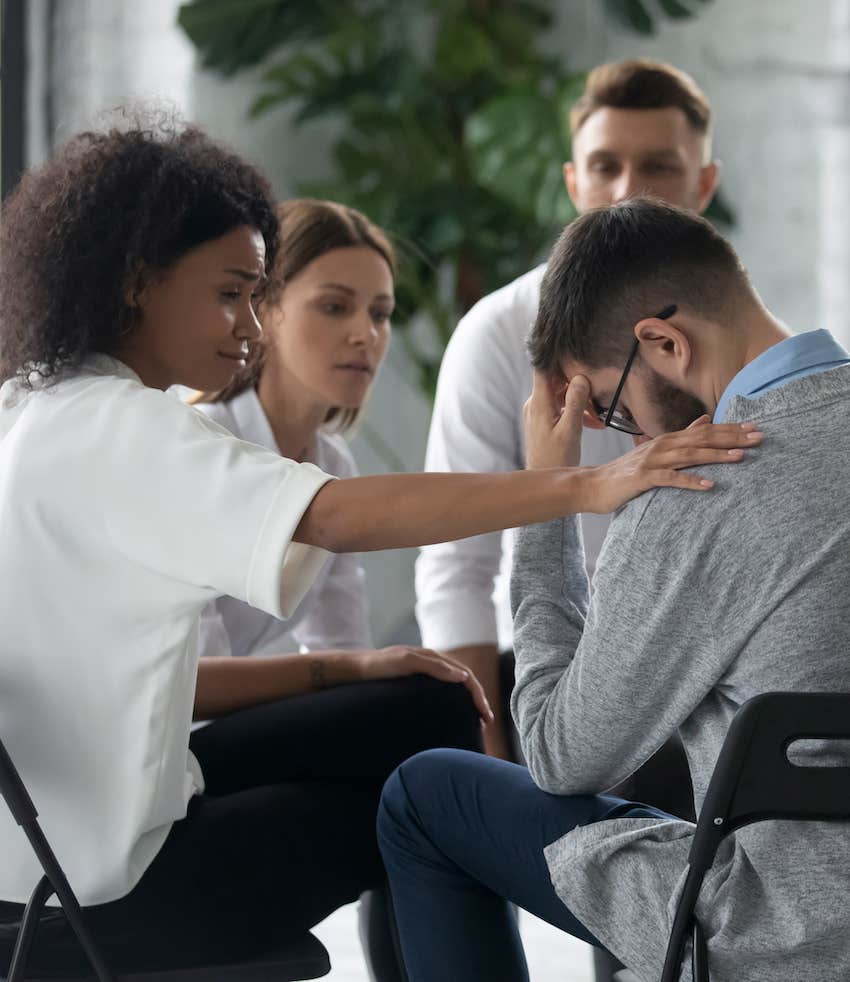I Couldn't Be A Good Mom Until I Agreed To This Extreme Type Of Therapy
I was terrified, but I needed to do it for my kids.
 Nuva Frames via Shutterstock
Nuva Frames via Shutterstock This is what the psych ward looks like: A small building off the interstate, brick, and unobtrusive. The reception room is covered in plush blue. An admissions office spurs off to one side, and two corridors, blocked by glass doors, lurch off at right angles. We sat in leather chairs and waited.
"I don't want to do this," I said shakily.
"You have to do this. For the kids," my husband told me. "You're not OK. You have to be OK for them."
I was withdrawing from an anti-psychotic prescribed off-label for treatment-resistant depression at the time. This made me cry for 18 hours a day. Combined with my history of depression and anxiety, I needed help.
"You can't take off."
"I'll take Family Medical Leave."
They called us into the admissions office, and I started to cry. My husband tried to soothe me, but I only cried. I'd cried nonstop for three days, the culmination of weeks of instability. I had finally agreed to do something about it because of my boys, ages five, three, and one.
I was a stay-at-home mom, and starting tomorrow, I would no longer stay at home. I'd be in a hospital.
Instead, I would come here, where I'd technically be admitted to the psychiatric hospital's clinic for a day program designed to make me less depressed and more functional. I agreed to come.
Then, I didn't agree. My husband shoved me out the door into the spring morning with an apple, a snack pack of chips, and some almonds. I climbed into his car — he needed mine, with the baby seats — under the dappled light of the birch tree. I drove down two interstates and parked. I was there, isolated from my babies until 3 PM. It was 9 AM. I hurt.
I spent the first morning filling out paperwork, then got thrown together with people who had similar issues: Group 2.
About ten people were seated in uncomfortable chairs on the perimeter of a room. It's cliché to say the chairs were uncomfortable, but they were — oh, they were, cobbled together from some blond wood, with padding colored like a Vegas carpet. Clearly, they were some modernist design meant for the parts to integrate with the whole with curved arms and legs.
You could read something into that, but they were probably no more than a budgetary concern. I picked a chair next to a table, sat my tea on it, and tried to shrink down in the fluorescent light.
About ten other people occupied those chairs. They had an easy way with each other, the manner of people who've shared something deep and horrible. I can't tell you anything more about them.
Group is sacrosanct, like Fight Club, the first rule of Group is you don't talk about Group.
 fizkes via Shutterstock
fizkes via Shutterstock
I can't say anything about the serious talks that go on there and about the tears, prayers, shouting, rage, and redemption.
If you meet someone from your group on the street, you have to pretend not to know them, though your eyes will meet (this happened to me), and for a second, you'll both be haunted.
What group therapy is actually like
We did Coping Skills, where we learned various healthy ways to manage our emotions.
For example, the Gottman Institute has recommended, "When you are feeling a certain emotion, don’t deny it. Acknowledge and accept that the emotion is present, whether it is anxiety, grief, sadness, or whatever you are experiencing in that moment. Through mindful acceptance, you can embrace difficult feelings with compassion, awareness, and understanding towards yourself and your partner."
Gottman continues, "Think of a friend or a loved one who might be having a hard time. What would you say to them? Bring the scenario of what you would say to them into your mind’s eye. Now, say the same thing to yourself: “I am okay. I am not to blame. I did the best I could.”
I applied them all to not shouting at my kids. To be a good mother to my kids. To help them, to read to them when I didn't feel like it.
Whenever we went around the room to say how we'd use a particular skill, I'd reference my kids. Even my story in Group referenced motherhood thwarted.
We did exercises — some stupid, like blowing bubbles to release our inner demons — and some good, like letting something we didn't like skim over our minds.
The yoga teacher made us sit upside-down on our chairs, heads on the floor.
The preacher offended me (the hospital was, at least nominally, Baptist). Every minute, every second, I missed my kids. Every wasted exercise was wasted time I could have spent with them. I wanted them back. Not that I didn't have them. I'd come home at 3 PM, and they'd yell, "Mama!"
The baby would toddle over to be picked up. I'd spend the rest of the blessed day with them, as much as I could; therapy and changes to my drug regime exhausted me. But I did what I could.
On my birthday, we went to the lake. Some days, we managed Target. One day, we planted cactus in the front yard. I lived for these snatches of time.
The time came for me to graduate
I'd stepped down to half days, and now, they deemed me fit enough to go out into the world with coping skills to deal with it. One more Group, where they told me their wishes, hopes, and impressions of me.
Almost everyone said I was a good mom, and I glowed inside with reassurance.
"You're especially a good mom for coming here," one said. "You know you needed it, and you came." I had, and I did.
Dr. Jonice Web explained the benefits of therapy as a parent, "Armed with healthy self-love and a sense you are good enough, your child will learn self-love too and will grow up feeling strong and knowing, deep down, that they are lovable. You can set yourself on a clear path to a happier, healthier, and more connected, effective parent to your children."
I did it for them. I never knew the psych ward could make you feel blown up and lighter all at once, like a hot air balloon flying home. Home, finally, to my kids.

